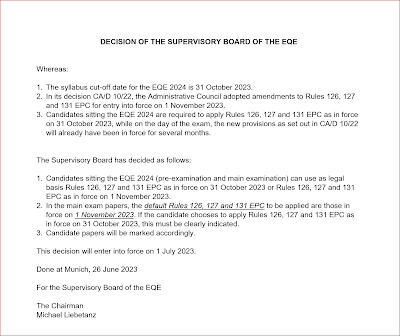EQE 2024 exam schedule now available: Pre-Exam
The "Information on the schedule for the EQE 2024 examination papers" (dated 27 July 2023) is now available on the EQE website.
The EQE 2024 will take place online using the examination software Wiseflow, with substantially the same setup as the e-EQE/Online EQE of 2021, 2022 and 2023.
The pre-examination is again split into four parts of 70 minutes, each part having 5 questions (4 statement per question). Each part must be completed before the start of the next break, with the next set of questions only becoming available after the break. Once the time allowed for a part has elapsed, it will not be possible to go back to that part. The pre-examination lasts four hours and forty minutes.
No documents will be available for printing in the legal parts,
Candidates will be allowed to print the description of the invention as well as the prior-art documents for the claim analysis parts before the start of the appropriate part. The documents allowed for printing will be made available during the break preceding the relevant claim analysis part.
No calendars will be provided (see here).
Further, in view of the amendments to Rule 126(2)/127(2)/131(2) EPC per 1 November 2023 (1 day after the legal cutoff date acc IPREE, i.e., 31 October 2023), refer to: this blog post
(Note that that the document may be subject to minor changes as testing continues. Please check the EQE website for updates. E.g., for EQE 2023, an updated version of the document was published in December.)
Please feel invited to post your comments. You are allowed to post anonymously and do not need an account, but please give your name or a nickname for an easy and inter-human interaction.


.png)









